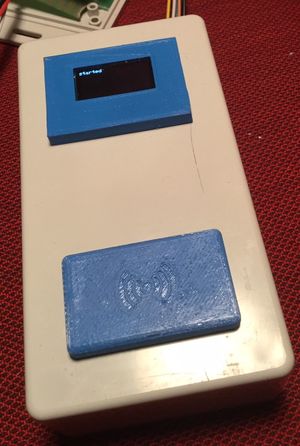Node ByeBye: verschil tussen versies
(→Troubleshooting) |
(→Troubleshooting) |
||
| Regel 53: | Regel 53: | ||
== Troubleshooting == | == Troubleshooting == | ||
| − | If node is unhappy, try looking at MQTT output of nodebyebye. It should give it's IP address among other usefull information. | + | If node is unhappy, try looking at MQTT output of nodebyebye. It should give it's IP address among other usefull information. grep for '{' to get reports from nodes withouth much other clutter. |
If there is no MQTT output and you don't know it's IP adress, connect to USB. On serial it will output usefull information like whether or not it has a network connection etc. And it's IP address. | If there is no MQTT output and you don't know it's IP adress, connect to USB. On serial it will output usefull information like whether or not it has a network connection etc. And it's IP address. | ||
| Regel 61: | Regel 61: | ||
'''BELANGRIJK''' | '''BELANGRIJK''' | ||
| − | Als je de USB aansluit - doe dat dan 1) of van een ongeaarde laptop (veel laptops hebben een simpele 2 polige platte steker zonder aarde); of 2) zorg dat de ethernet stekker er niet in zit. Of 3) gebruik een galvanisch scheidende USB kabel. | + | Als je de USB aansluit - doe dat dan 1) of van een ongeaarde laptop (veel laptops hebben een simpele 2 polige platte steker zonder aarde, or can be run from battery); of 2) zorg dat de ethernet stekker er niet in zit. Of 3) gebruik een galvanisch scheidende USB kabel. |
Dit alles om een lus via de aarde te voorkomen. Daar kan de POE niet tegen. | Dit alles om een lus via de aarde te voorkomen. Daar kan de POE niet tegen. | ||
| + | |||
| + | ''' IMPORTANT ''' | ||
| + | |||
| + | If you connect over USB - to prevent ground loops (POE can't handle them): 1) use a non-grounded laptop (most have a simple 2 prong plug, of kunnen vanaf hun batterij draaien); or 2) make sure the ethernet isn' t plugged in. Or 3) use a galvanic isolating USB cable. | ||
== History == | == History == | ||
Versie van 18 sep 2019 om 22:00
Note mounted on the door to let people `check out'.
Inhoud
[verbergen]State
Pretty much operational. Not yet showing things like lights left on.
Bevat [test versie van de software].
Hardware
This is a PoE wired node; to patch port B3 -- see NetworkSetup2018#Patch_Paneel port 22. The board is [Olimex ESP-32 PoE] based.
i2c rfid reader
MFRC522, 3v3
Enclosure on [thinkiverse]. The extra slice is a drilling template.
i2c OLED screen
SD 1306, 128x64, blue, 3v3
Enclosure on [thinkiverse].
Wiring
const uint8_t I2C_SDA_PIN = 13; //SDA; // i2c SDA Pin, ext 2, pin 10 const uint8_t I2C_SCL_PIN = 16; //SCL; // i2c SCL Pin, ext 2, pin 7 const uint8_t oled_sd1306_i2c_addr = 0x3C; const uint8_t mfrc522_rfid_i2c_addr = 0x28; const uint8_t mfrc522_rfid_i2c_irq = 4; // Ext 1, pin 10 const uint8_t mfrc522_rfid_i2c_reset = 5; // Ext 1, pin 9 const uint8_t aart_led = 15; // Ext 2, pin 8 const uint8_t pusbutton = 1; // Ext 1, pin 6 #define SCREEN_WIDTH 128 // OLED display width, in pixels #define SCREEN_HEIGHT 64 // OLED display height, in pixels Adafruit_SSD1306 display(SCREEN_WIDTH, SCREEN_HEIGHT, &Wire, -1 /* no reset */); TwoWire i2cBus = TwoWire(0); MFRC522_I2C * dev = new MFRC522_I2C(mfrc522_rfid_i2c_reset, mfrc522_rfid_i2c_addr, i2cBus); MFRC522 mfrc522 = MFRC522(dev);
Test HW app in [github]. Deze test alle hardware functies.
Troubleshooting
If node is unhappy, try looking at MQTT output of nodebyebye. It should give it's IP address among other usefull information. grep for '{' to get reports from nodes withouth much other clutter.
If there is no MQTT output and you don't know it's IP adress, connect to USB. On serial it will output usefull information like whether or not it has a network connection etc. And it's IP address.
If you already know it' s IP address, there is no need to connect over USB: the same information can be gotten by telnetting to this IP.
BELANGRIJK
Als je de USB aansluit - doe dat dan 1) of van een ongeaarde laptop (veel laptops hebben een simpele 2 polige platte steker zonder aarde, or can be run from battery); of 2) zorg dat de ethernet stekker er niet in zit. Of 3) gebruik een galvanisch scheidende USB kabel.
Dit alles om een lus via de aarde te voorkomen. Daar kan de POE niet tegen.
IMPORTANT
If you connect over USB - to prevent ground loops (POE can't handle them): 1) use a non-grounded laptop (most have a simple 2 prong plug, of kunnen vanaf hun batterij draaien); or 2) make sure the ethernet isn' t plugged in. Or 3) use a galvanic isolating USB cable.
History
| Datum | Beschrijving |
|---|---|
| Q2 2019 | In gebruikname |
| 2019-09-18 | Outage - ethernet stekker onhappy na nieuwe aansluiting 5v voor display apparaten; opgelost door opnieuw aankrimpen stekertje aan kant node door Lucas. |
| Voorbeeld | Voorbeeld |
